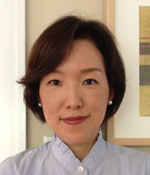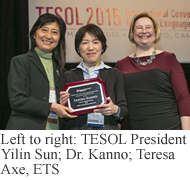|
 The title of Dr. Yasuko Kanno’s award-winning research, “‘I’m Not Going to Be, Like, for the AP’: English Language Learners’ Limited Access to Advanced College Preparatory Courses in High School,” almost has to be read aloud with a tinge of flair to be fully realized. And that’s exactly what Teresa Axe of ETS did at the 2015 TESOL International Convention & English Language Expo when she presented Kanno, a faculty member at Temple University, with the prestigious TESOL Award for Distinguished Research. The title of Dr. Yasuko Kanno’s award-winning research, “‘I’m Not Going to Be, Like, for the AP’: English Language Learners’ Limited Access to Advanced College Preparatory Courses in High School,” almost has to be read aloud with a tinge of flair to be fully realized. And that’s exactly what Teresa Axe of ETS did at the 2015 TESOL International Convention & English Language Expo when she presented Kanno, a faculty member at Temple University, with the prestigious TESOL Award for Distinguished Research.
“So, what exactly does the title mean?” I naively asked when Kanno and I sat down to talk at the convention in Toronto this March. The explanation required some context. Kanno, in tandem with her doctoral student Sara Kangas, were interested in ELLs' college access. Quite surprisingly, Kanno explained, this is not a subject that has really been researched. Often when investigating issues of college access, researchers look at disparities between ethnic groups, household income levels, and socioeconomic backgrounds. There is a need to look at the ELLs’ experience uniquely to better understand the reasons they struggle to advance to college.
 The study she performed followed a range of ELLs from high performing to low performing. What she found was that regardless of performance level, these students still experience limited access to advanced college-preparatory courses, which serve as a funnel into higher education. Her study illuminated structural barriers that exist for ELLs and contribute to a mentality that high-level education is not for them. That’s what the quote in the title was getting at. When asked about advanced placement (AP) courses, Erica, the high-performing student in the study, replied, “I’m not going to be, like, for the AP.” Kanno explains, as ELLs they don’t see themselves as as belonging to the caliber of students who take AP courses. The study she performed followed a range of ELLs from high performing to low performing. What she found was that regardless of performance level, these students still experience limited access to advanced college-preparatory courses, which serve as a funnel into higher education. Her study illuminated structural barriers that exist for ELLs and contribute to a mentality that high-level education is not for them. That’s what the quote in the title was getting at. When asked about advanced placement (AP) courses, Erica, the high-performing student in the study, replied, “I’m not going to be, like, for the AP.” Kanno explains, as ELLs they don’t see themselves as as belonging to the caliber of students who take AP courses.
In ways, Kanno’s research is reflective of her own journey to self-empowerment within a foreign language context. As a promising high school student in Japan, Kanno was accepted into United World College of the Atlantic, a prestigious international school in the United Kingdom. It was there that she learned English. “It was a very sink-or-swim environment,” she expressed. “I myself internalized the deficit identity, the belief that there is something lacking in me because I didn’t speak English.” That experience got her thinking at an early age that there must be a better, more positive way to learn English.
After receiving her doctorate under the tutelage of Dr. Jim Cummins, Kanno worked at a university in Japan for 4 years but found that Japanese academia lacked real opportunities for women. After encountering years of discouraging rejections when she applied to institutions in North America, she got hired for a 1-year stint at Monterey Institute for International Studies, which blossomed into a position at the University of Washington (UW) in Seattle. It was at UW that while interviewing ELLs at the university level she was pushed to see what is going on with ELLs in high school.
When asked about future implications of her research, Kanno shared a story:
When I gave a talk at AAAL in March, one of the members of the audience said, “Isn't the same thing (ELLs’ limited access to advanced-level courses) happening to racial minority students, low-income students, and first-generation-college students?” While that is absolutely true, one crucial difference is that in the case of these other groups of students, we never institutionally condone their differential access to advanced courses—to do so would be discriminatory. Yet, in the case of ELLs, we somehow share a discourse that legitimizes policies that limit ELLs’ access to advanced courses. It is critical that we collectively interrogate the ideologies and discourses that normalize ELLs’ limited opportunity to learn.
Though Kanno insists that she is not a pioneer, saying, “I don’t think of myself as a trailblazer,” and then listing other scholars she finds more influential, her research has indeed launched a greater discussion about the achievement gap that exists for ELLs.
________________________________
Cydny Black is the program assistant for public policy and communications at TESOL International Association. In addition to her work for the association, Black is enrolled at American University, where she is working toward an MA in international communications. A DC transplant from her native Madison, Wisconsin, Black enjoys the outdoors, readings, and advocacy work.
|